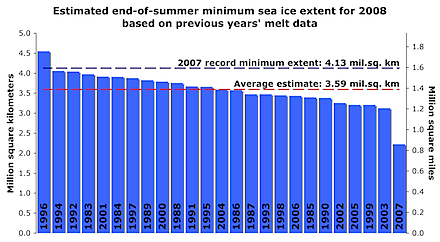 Prognostications on the fate of the Arctic sea ice this boreal summer are coming in thick and fast. The National Snow and Ice Data Centre in the US has updated its summer news page with the latest data and some projections of what might happen:
Prognostications on the fate of the Arctic sea ice this boreal summer are coming in thick and fast. The National Snow and Ice Data Centre in the US has updated its summer news page with the latest data and some projections of what might happen:
Spring has arrived in the Arctic. After peaking at 15.21 million square kilometers (5.87 million square miles) in the second week of March, Arctic sea ice extent has declined through the month of April. April extent has not fallen below the lowest April extent on record, but it is still below the long-term average. Taken together, an assessment of the available evidence, detailed below, points to another extreme September sea ice minimum. Could the North Pole be ice free this melt season? Given that this region is currently covered with first-year ice, that seems quite possible.
Most striking are the estimates of this summer’s likely minimum based on the melting rates observed over the last 25 years.

“To avoid beating the September 2007 record low, more than 50% of this year’s first-year ice would have to survive; this has only happened once in the last 25 years, in 1996.”
Meanwhile, Andy Revkin at the New York Times has been asking sea ice researchers for their views. You can read their replies in the comments to his post. A number of well-known names are backing a new record, including BIll Chapman, the researcher responsible for the excellent Cryosphere Today site (I want to get an iPhone so that I can try out the special graphics CT provides), who writes:
The two wild cards remaining would be (1) how thick is this first-year ice and (2) will it be warm enough to melt the first-year ice this summer? Since temperatures over the central Arctic were normal to above normal this past winter and spring, I don’t think the thickness will be too great. The key will be June temperatures and cloud cover in the central Arctic. Given relatively clear conditions and an early to average start to the melt of the central Arctic, the albedo will lower and the process will be in motion to easily melt that first year ice. In fact, the only thing that could prevent a record would be a colder than average summer – especially early summer. Given recent history and our penchant for burning fossil fuels, I’d consider this somewhat unlikely.
I say the odds favor a new NH record minimum – put my money there.
My money’s already there… Good to know I’m backing the form horse, even if I would rather lose.
